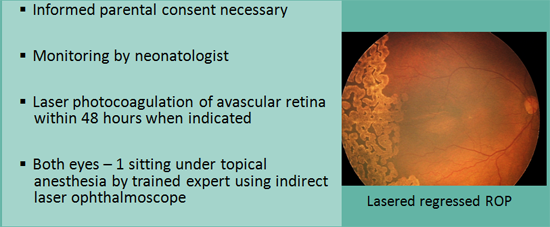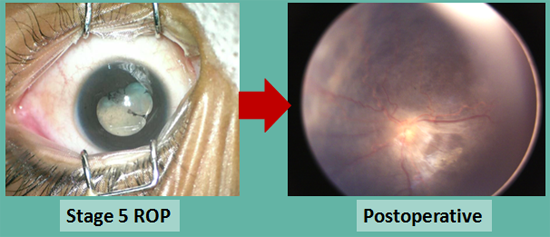ROP treatment
- Introduction...
- 1. Indications of ...
- 2. Mechanism of la...
- 3. Laser procedure...
- 4. Post laser foll...
- 5. Current usage: ...
- 6. Limitations of ...
- 7. ROP surgery...
- 8. ROP surgery-01...
- 9. Key messages...
 |
 |
Introduction
DR. PARIJAT CHANDRA
MD, DNB (Ophthalmology)
Additional Professor (Ophthalmology)
Vitreoretina & ROP Services,
R.P. Centre, AIIMS, New Delhi
1. Indications of laser treatment
► Early Treatment of ROP (ETROP) guidelines
► Type I ROP - Treat
♦ Zone I, any stage with plus
♦ Zone I, stage 3 without plus
♦ Zone II, stage 2-3 with plus (Including APROP)
2. Mechanism of laser
► Laser destroys avascular retina
► Removes ischemic stimulus
► Decrease neovascularization, fibrovascular proliferation
► Regression of ROP
3. Laser procedure

4. Post laser follow up
► Antibiotic/ steroid + tears eye drops TDS – 5 days
► Follow up 1 weekly to observe ROP progression/ regression
► Review for laser augmentation in skip areas
► Long term follow up 4 monthly for retinal status and refraction
5. Current usage: Anti VEGF drugs

6. Limitations of anti VEGF drugs
► No clarity on dose/ number of injections
► No clarity on which anti VEGF drug is better
► Risk of systemic absorption and side effects
► No study on long term outcomes
► Delayed recurrences common
7. ROP surgery
► Stage 4 ROP - Subtotal retinal detachment
► 25G/27G lens sparing vitreoretinal surgery - good outcomes

8. ROP surgery-01
► Stage 5 ROP - Total retinal detachment - Poor prognosis
► Surgical trial in hope of restoring navigable vision in
bilateral cases

9. Key messages
► Laser treatment for ROP is effective and has good outcomes
► Anti VEGF drugs is useful in adjunct to laser in selected cases
► Surgery for ROP is useful in selected advanced cases, but
prognosis is poor in stage 5 ROP
► Timely ROP screening and treatment is a key to prevent ROP
blindness
